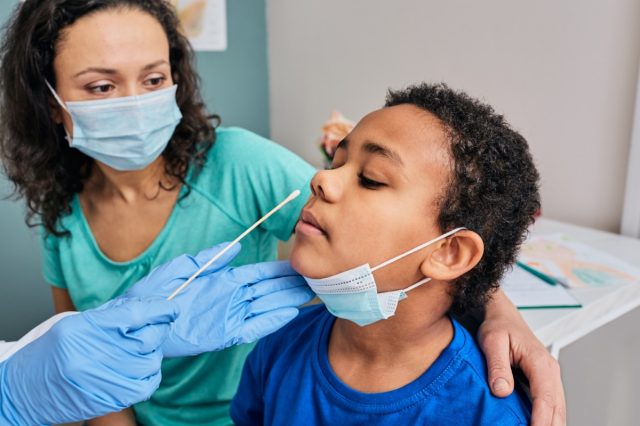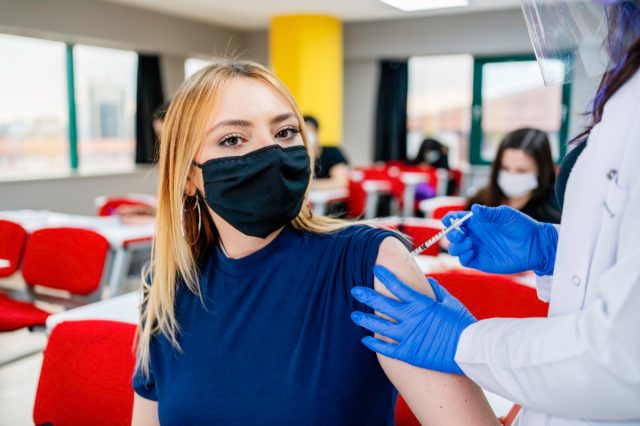A COVID Surge is Coming and Here’s How to Stay Safe — Eat This Not That
COVID cases have been falling in the US, leading people to wonder if we’re still in a pandemic – we are, but experts are worried about a possible spike this winter due to rising cases European countries like Great Britain, France and Italy. “In the past, what happened in Europe was often a harbinger of what’s going to happen in the United States,” he says Michael Osterholm, director of the Center for Infectious Disease Research and Policy at the University of Minnesota. “So I think the bottom line message for us in this country is we need to be prepared for what they are starting to see in Europe.”
Another thing pundits are watching closely is new Omicron variants jump up. “We look around the world and see that countries like Germany and France are growing as we speak,” he says Lauren Ancel Meyers, director of the UT COVID-19 Modeling Consortium at the University of Texas at Austin. “That makes me stop. It increases uncertainty about what to expect in the coming weeks and months ahead.”
While it’s likely that the US will see a spike in cases, it’s not certain. NPR, reports: “This is because it is not clear whether the increase in cases in Europe is related to people’s greater vulnerability to new subvariants to which they have not yet been exposed. Also, different countries have different levels of immunity.” Justin Lessler, an epidemiologist at the University of North Carolina who helped lead the Hub for COVID-19 Scenario Modeling says: “If it’s mainly just about behavior change and climate, we can potentially avoid similar spikes if the bivalent vaccine is widely adopted,” says Lessler. “If it’s an immune escape across multiple variants with convergent evolution, the prospects for the US could be more concerning.” Read on – and don’t miss this one to protect your health and the health of others Sure signs you already had COVID.

According to NPR, “The Virus concentrations in wastewater have risen in some parts of the country, as in Pennsylvania, Connecticut, Vermont, and other parts of the Northeast. That could be an early warning sign of what’s to come, even though the virus as a whole is declining nationwide.”
“It’s really early to say anything big is happening, but we’re keeping an eye on it,” he says Amy Kirby, Head of the national wastewater monitoring program at the Centers for Disease Control and Prevention.
NPR reports, “But infections and even hospitalizations have increased in some of the same parts of New England, as well as some other northern areas, like the Pacific Northwest, according to Dr. David Rubin, the director of the PolicyLab at Children’s Hospital of Philadelphia, which is tracking the pandemic. “We see that the northern edge of the country is showing signs of increasing transmission,” says Rubin. “The resurgence of winter begins.”

David SoulelesMPH, Director of the COVID-19 Response Team at the University of California, Irvine, tells us: “The evidence of a possible surge can be seen by looking at our neighbors to the east and west, particularly Europe, where case numbers are on the rise. There have also been reports that we should expect a bad flu season, which will make monitoring COVID cases more difficult as the symptoms are similar. To prevent severe reactions to COVID and the flu, we need to get vaccinated and take other measures, including hygiene, getting good sleep, eating healthily, tracking the number of cases in your community, and being mindful of the spread of the virus.”
A senior Chicago doctor expects cases to spike and has said so ABC, “I haven’t seen anything really scary on the horizon yet, but I think we will see a COVID surge. I would be the happiest person on earth if we get into February or March and we haven’t even seen a little COVID spike just because it’s respiratory season and the way we look like flu and RSV and everything others increase in winter, I think we expect at least some COVID increase,” Dr. Allison Arwady, commissioner of the Chicago Department of Public Health said. “The question is really, what about variants?”

In addition to concerns about COVID this winter, experts are also warning about the flu. dr Benjamin Alli, MD/ PhD Sakellerides Professor and author of Not just covidcoming out later this month, tells us: “This winter is expected to be particularly brutal due to influenza (twin virus) and other respiratory illnesses, which have been on the rise in various areas – largely due to misinformation (controversy over continued use of a mask) and a drop in those in the healthcare industry wanting to continue for a variety of reasons including stress, personal crises, pay and more.
ABC reports: “Hospitals across the country are bracing themselves for another winter with Covid – the first that is also expected to include high levels of influenza and other respiratory illnesses that have been quietly simmering in the background for the past two years. Flu cases are already increasing in parts of the US, after the Centers for Disease Control and Prevention. Pediatricians are also seeing an increasing number of children suffering from respiratory syncytial virus or RSV enteroviruses. And despite one Downward trend in CovidTens of thousands of new cases are still being diagnosed every day.

More people have received the vaccine, which will help with some immunity.
NPR reports, “We have a lot more immunity in the community than we did last winter,” he says Jennifer Nuzzo, who directs the Pandemic Center at Brown University School of Public Health. “Not only did people get vaccinated, but many people have now contracted this virus. In fact, some people have contracted it multiple times. And that builds up [immunity] in the population and overall reduce our risk of serious illness,” says Nuzzo.
However, the interest in the latest booster is really low. “Nearly 50% of people who are eligible for a booster shot didn’t get one,” she says William Hanage, Associate Professor of Epidemiology at Harvard TH Chan School of Public Health. “It’s wild. It’s really crazy.” The new booster became available over Labor Day weekend and fMore than 8 million people got one. With an increase likely to occur, Nuzzo reminds us that staying up to date on the boosters is important. “The most important thing we can do is take away from the table that this virus can cause serious illness and death,” she says. “There are a lot of people who could really benefit from a boost but haven’t.”

Bernadette Boden-AlbalaMPH, DrPH, Founding Dean of the UCI Public Health Programme, says: “To prevent severe reactions to COVID and the flu, we need to be vaccinated and take other measures including hygiene, good sleep, good nutrition and tracking cases of your community and remember to spread the virus.”
dr William Li, physician, scientist, president and medical director of the Angiogenesis Foundation and author of Eat to Beat Disease: The New Science of How Your Body Can Heal Itself explains: “The easiest way to protect yourself against serious illness from COVID is to get your bivalent vaccine. While you can still get infected from exposure, you won’t get as seriously ill and likely won’t need to be hospitalized. The easiest way to avoid being exposed to this is to wear a good quality (N95/KN95) mask, which is readily available.” And to protect your life and the lives of others, don’t visit any of them 35 places where you are most likely to contract COVID.